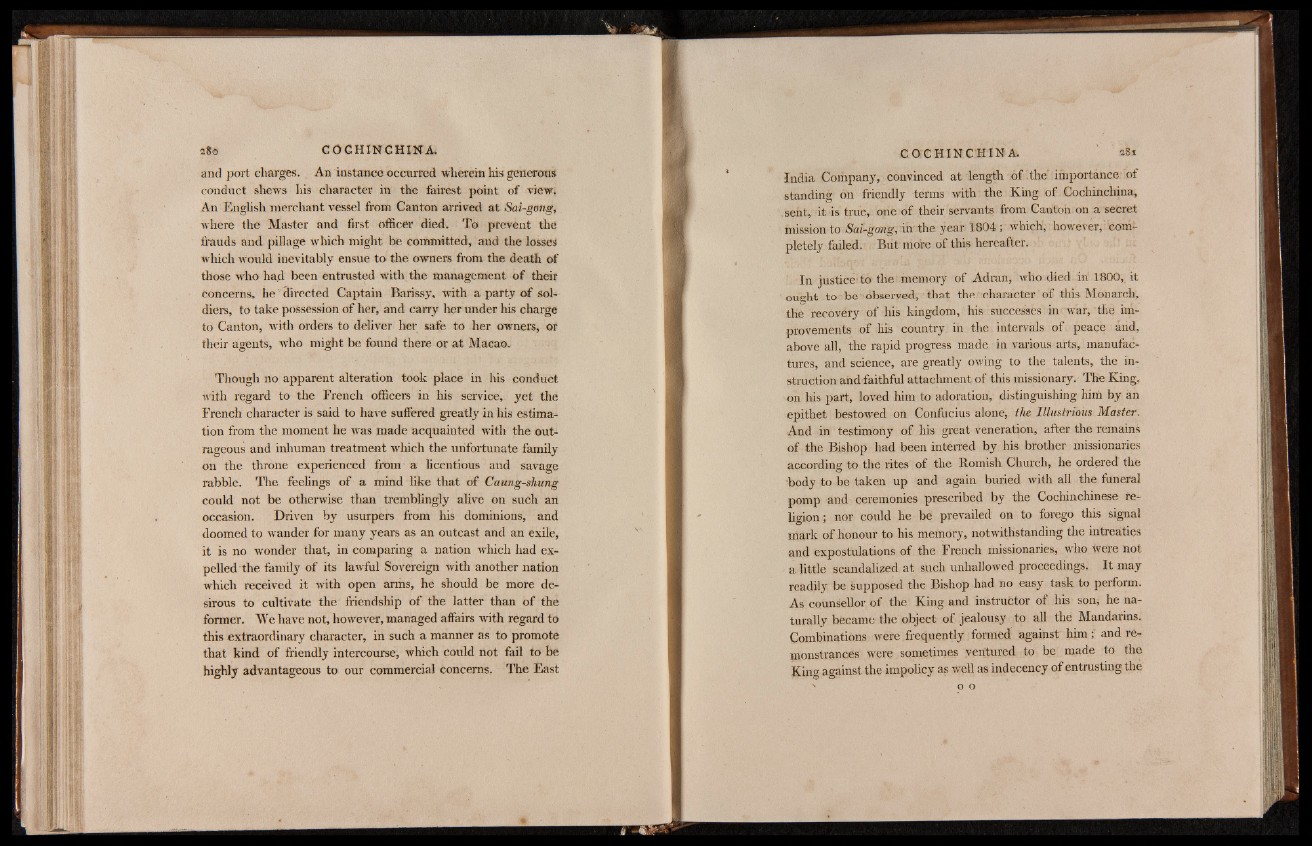
and port charges. An instance occurred wherein his generous
conduct shews his character in the fairest point of view.
An English merchant vessel from Canton arrived at Sai-gong,
where the Master and first officer died. To prevent the
frauds and pillage which might be committed, and the losses
which would inevitably ensue to the owners from the death of
those who had been entrusted with the management of their
concerns, he directed Captain Barissy, with a party of soldiers,
to take possession of her, and carry her under his charge
to Canton, with orders to deliver her safe to her owners, or
their agents, who might be found there or a t Macao.
Though no apparent alteration took place in his conduct
with regard to the French officers in his service, yet the
French character is said to have suffered greatly in his estimation
from the moment he was made acquainted with the outrageous
and inhuman treatment winch the unfortunate family
on the throne experienced from a licentious and savage
rabble. The feelings of a mind like that of Caung-shung
could not be otherwise than tremblingly alive on such an
occasion. Driven by usurpers from his dominions, and
doomed to wander for many years as an outcast and an exile,
it is no wonder that, in comparing a nation which had expelled
the family of its lawful Sovereign with another nation
which received it with open arms, he should be more desirous
to cultivate the friendship of the latter than of the
former. We have not, however, managed affairs with regard to
this extraordinary character, in such a manner as to promote
that kind of friendly intercourse, which could not fail to be
highly advantageous to our commercial concerns. The East
India Company, convinced at length of the importance of
standing on friendly terms with the King of Cochinchina,
sent, it is true, one of their servants from Canton on a secret
mission to Sai-gong, in the year 1804; which, however, completely
failed. But more of this hereafter.
In justice to the'memory of Adran, who died in 1800, it
ought to be -Observed, that the "character of this Monarch,
the recovery of his kingdom, his successes in war, the improvements
of his country in the intervals of peace and,
above all, the rapid progress made in various arts, manufactures,
and science, are greatly owing to the talents, the instruction
and faithful attachment of this missionary. The King,
on his part, loved him to adoration, distinguishing him by an
epithet bestowed on Confucius alone, the Illustrious Master.
And in testimony of his great veneration, after the remains
of the Bishop had been interred by his brother missionaries
according to the rites of the Romish Church, he ordered the
body to be taken up and again buried with all the funeral
pomp and ceremonies prescribed by the Cochinchinese religion;
nor could he be prevailed on to forego this signal
mark of honour to his memory, notwithstanding the intreaties
and expostulations of the French missionaries, who were not
a little scandalized at such unhallowed proceedings. I t may
readily be supposed the Bishop had no easy task to perform.
As counsellor of the King and instructor of his son, he naturally
became the object of jealousy to all the Mandarins.
Combinations were frequently formed against him; and remonstrances
were sometimes ventured to be made to the
King against the impolicy as well as indecency of entrusting the
y 00